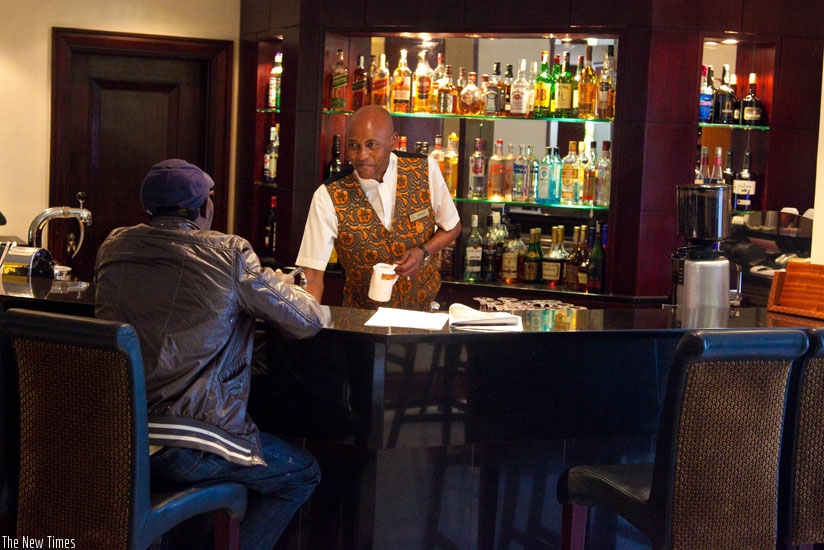Customer service is not a department, it’s an attitude, according experts in the field and most people would probably agree with that because regardless of the efforts and strategies put in place to boost Rwanda’s customer services, little has been achieved yet.


Customer service is not a department, it’s an attitude, according experts in the field and most people would probably agree with that because regardless of the efforts and strategies put in place to boost Rwanda’s customer services, little has been achieved yet.
A campaign dubbed ‘Na yombi was launched in March 2012 and its aim was to raise consumer awareness on the importance of customer care to service providers and users in order to increase competitiveness. It was part of the government’s efforts to improve service delivery in all sectors around the country.
However, four years down the road, the issue still raises numerous complaints thereby impeding the development of both the private and public sector.
A one Nellie Ingabire through her face book post on the ‘Tell Us’ the TSM Compliments and Complaints Site-a face book page where people post compliments or complaints about customer service in Rwanda, complained about the way some hospital staff neglect their responsibilities putting the lives of their patients who are supposedly under their care at risk.
She had this to post, "I will comment on one public hospital where most of its night shift staff gathers in one room to watch Nigerian movies than be around patients. If you visit this hospital and talk to the patients, most of them have no hope of survival.
"Many patients die in the hands of the person taking care of them than in the hands of a doctor or a nurse and to make matters worse, I think they don’t have intensive care unit. Most badly off patients die in the main wards leaving the other patients in total fear of what is coming to them.”
Such inconsiderate acts not only affect the smooth running of an organization but also put the lives of citizens at stake.
Still from the same media platform, Paul Mutanga complained about the service provided by some telecommunication companies saying that their service providers seem to not know what they are meant to do.
He had this to post, "I have never been to a service center to raise a complaint and seen such clueless people like the staff of Airtel Service Center in UTC and head office in Remera. I loaded UGX 20,000 that was confirmed as Rwf 4,440 on one network on 20th Jan from Kampala but none of them can explain where it disappeared without me using it. They SC Managers who have access to MINSAT software are even more clueless than their agents.
They are both quick to pass a buck or blame Airtel Uganda yet its Airtel Rwanda line that I have. They promise to consult and call but never do. All I said is tell me how the airtime got used so that I avoid the same mistake again in future.”
Ingabire and Mutanga’s cases are not isolated as many people still complain on the services provided by a good number of institutions.
What do the service providers say?
Jackie Umwiza (names withheld) who works in the Hospitality sector as a customer care agent agrees that there are indeed service providers who don’t execute their duties as required though the fault shouldn’t be generalized to all agents.
"I understand that not all of us do our jobs as we are required to but we also have to consider the fact that some people are just hard to deal with. We are also humans and we are not perfect, we are at fault sometimes, one may be having a number of clients to deal with at the same time yet each one of them wants to be attended to immediately. Some clients may also fail to understand certain procedures but end up putting the blame on us,” Umwiza says.
She however calls upon service providers and customer care agents, that regardless of circumstances they should always to do their best so that this specific department is improved upon.
Dennis Mutaganzwa, a bar owner in Kigali says that customer service is the number one tool he uses to succeed in business. To him the customer is the king and that’s how he has managed to survive in this business.
"People tend to undermine this factor yet it is very crucial for a business to succeed, however managers should also get means of following up on their employees on the way they handle clients since most cases go unknown by the business owners,” he adds.
Sandra Idossou a hotelier and trainer in quality customer service says that there is general awareness about customer service in Rwanda ever since a number of various campaigns were started sometime back.
She says Public institutions seem to take the lead as they have managed to put up imposed systems and standards in their institutions. A good example is the Rwanda Immigration.
Idossou points out that poor customer service not only affects businesses negatively but also has a terrible effect on public institutions too and in many ways.
Poor customer service affects efficiency and productivity of teams; it reduces the affirmative impact of positive word to mouth advertisement because if a customer is not satisfied with a company’s services, he becomes a bad agent for the business.
"And in today’s modern way, we need to understand the importance of social media in branding one’s reputation. Substandard service will eventually bring a company down.”
Improving customer service implies putting in place systems and standards that help teams deal efficiently with customers. Training is also an important tool to improve services.
"Don’t just throw your teams in the waters and expect them to swim by themselves, institutions should give their customers efficient way to provide feedback, the archaic suggestion boxes do not work in this modern age. Team players should also understand what is in it for them in providing good service,” she advises.
In an interview with Sunday Times, Yves Ngenzi the head of the Customer Care Unit at the Rwanda Development Board revealed that the level of customer satisfaction today stands at 71% compared to 65% customer satisfaction in 2010, and the target is to reach 80% satisfaction by the year 2017.
He says that they have put in place strategies to see that these goals are attained.
"In collaboration with regulatory agencies and the Private Sector Federation, legal frameworks and service standards have been developed and introduced in the hospitality, banking, transport and health sectors.”
To monitor progress, Rwanda development board in partnership with stakeholders, conducts periodic on-site inspection and off site analysis, and recognizes establishments that are performing well.
editorial@newtimes.co.rw


